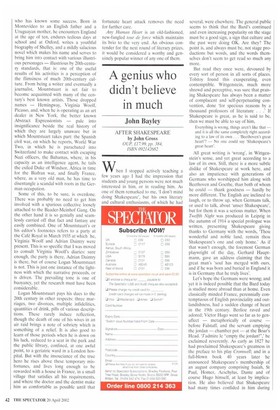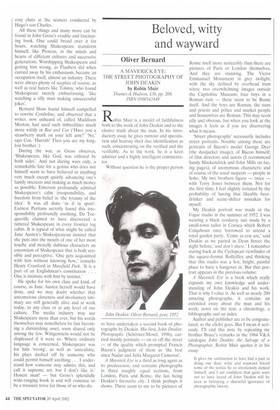A genius who didn't believe in much
John Bayley
AFTER SHAKESPEARE by John GTOSS OUP, £17.99, pp. 384, ISBN 092142682 When I stopped actively teaching a few years ago I had the impression that students and young persons were not much interested in him, or in reading him. As one of them remarked to me, 'I don't mind doing Shakespeare', but his own literary and cultural enthusiasms, of which he had
several, were elsewhere. The general public seems to think that the Bard's continued and even increasing popularity on the stage must be a good sign, a sign that culture and the past were doing OK. Are they? The point is, and always must be, not stage productions but words, and the words themselves don't seem to get read so much any more.
But read they once were, devoured by every sort of person in all sorts of places. Tolstoy found this exasperating, even contemptible. Wittgenstein, much more shrewd and perceptive, was sure that praising Shakespeare has always been a matter of complacent and self-perpetuating convention, done 'for specious reasons by a
thousand professors of literature . . If Shakespeare is great, as he is said to be, then we must be able to say of him,
Everything is wrong, things aren't like that — and it is all the same completely right according to a law of its own .. . 'Beethoven's great heart'? — No one could say 'Shakespeare's great heart'.
All great writing is 'wrong', in Wittgenstein's sense, and yet great according to a law of its own. Still, there is a more subtle dislike of Shakespeare at work here, and also an impatience with generations of Germans who worshipped him along with Beethoven and Goethe, than both of whom he could — thank goodness — hardly be more different. The English are inclined to laugh, or to throw up, when Germans talk, or used to talk, about 'unser Shakespeare', but for them it was a serious matter. When Twelfth Night was produced in Leipzig in the autumn of 1914 a special prologue was written, presenting Shakespeare giving thanks to Germany with the words, 'Thou wonderful and noble land, remain thou Shakespeare's one and only home.' As if that wasn't enough, the foremost German playwright of the day, Gerhard Hauptmann, gave an address claiming that the great man's 'soul has merged with ours, and if he was born and buried in England it is in Germany that he truly lives'.
Let's hope the Germans were wrong; and yet it is indeed possible that the Bard today is studied more abroad than at home. Even classically minded France, perennially contemptuous of English provinciality and outlandishness, had a sudden change of heart in the 19th century. Berlioz raved and adored; Victor Hugo went so far as to genuflect — metaphorically of course — before Falstaff, and the servant emptying the jordan — chamber pot — at the Boar's Head. Tadmire le "empty the jordan!",' he exclaimed reverently. As early as 1827 he had proclaimed Shakespeare's greatness in the preface to his play Cromwell; and in a full-blown book 40 years later he announced Shakespeare's membership of an august company comprising Isaiah, St Paul, Homer, Aeschylus, Dante and of course Hugo himself, at least by implication. He also believed that Shakespeare had many times confided in him during
cosy chats at the seances conducted by Hugo's son Charles.
All these things and many more can be found in John Gross's erudite and fascinating book. One could brood over it for hours, watching Shakespeare transform himself. like Proteus, in the minds and hearts of different cultures and successive generations. Worshipping Shakespeare and getting him wrong, as Flaubert did when carried away by his enthusiasm, became an occupation itself, almost an industry. There were always plenty of sceptics of course, as well as real haters like Tolstoy, who found Shakespeare merely embarrassing, 'like watching a silly man making unsuccessful jokes'.
Bernard Shaw found himself compelled to rewrite Cymbeline, and observed that a writer, now unheard of, called Maddison Morton, had used such imbecilities much more wittily in Box and Cox Nave you a strawberry mark on your left arm?' No,' says Cox. 'Hurrah! Then you are my longlost brother.') During the war, as Gross observes, 'Shakespeare, like God, was enlisted by both sides'. And not during wars only, a remarkable fate for a genius who does not himself seem to have believed in anything very much except quietly advancing one's family interests and making as much money as possible. Emerson profoundly admired Shakespeare's calm irresponsibility, and freedom from belief in 'the tyranny of the idea'. It was all done 'as if in sport'. Earnest Puritans secretly found this irresponsibility profoundly soothing. De Tocqueville claimed to have discovered a tattered Shakespeare in every frontier log cabin. It is typical of what might be called Jane Austen's Shakespearean instinct that she puts into the mouth of one of her most louche and morally dubious characters an encomium of Shakespeare that is both sensible and perceptive. 'One gets acquainted with him without knowing how,' remarks Henry Crawford in Mansfield Park. 'It is a part of an Englishman's constitution . . . One is intimate with him by instinct.'
He spoke for his own class and kind, of course, as Jane Austen herself would have done, and we may doubt whether that unconscious closeness and involuntary intimacy are still generally alive and at work today, in any class or at any level of our culture. The media industry may use Shakespeare more than ever, but his words themselves may nonetheless be fast becoming a diminishing asset, soon shared only among the few. Wittgenstein would not be displeased if it were so. Where ordinary language is concerned, Shakespeare was for him 'wrong', as well as 'unrealistic, his plays dashed off by someone who could permit himself anything . . . I understand how someone may admire this, and call it supreme art, but I don't like it.' Honest man! — but Gross's splendidly wide-ranging book is and will continue to be a treasure trove for those of us who do.







































































 Previous page
Previous page